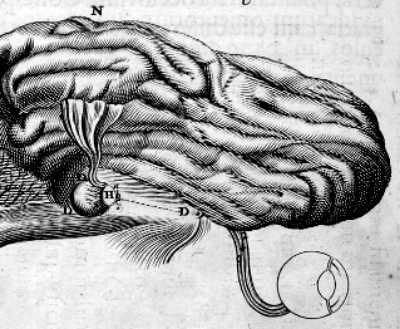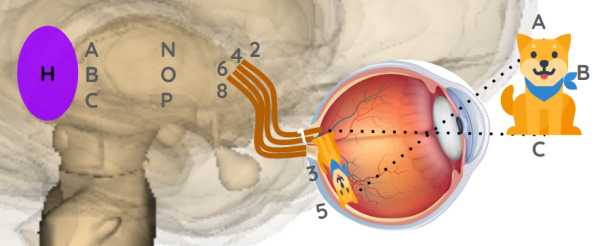Dreams
Table of Contents
Dreams depend:
- partly on the irregularity of the force of the spirits emerging from the pineal gland
- partly on the impressions of memory that come to mind.
Hence, they are the same as ideas.
These are formed in the imagination while daydreaming.
- The difference is that the images formed by dreams can be more distinct and vivid than those produced by daydreams.
This is why the same force may more easily open:
- certain channels, such as
2, 4, 6, and - certain pores, such as
a, b, c.

These serve the formation of ideas when the surrounding parts of the brain are slack and pendulous, as shown above compared to when all are tense, as shown below.

This is also why a sense-object that reaches the sleeping brain does not immediately form the same idea as when the person were awake.
- Instead, it would form one far more remarkable, astonishing, and intensely affecting.
For example, we might dream of:
- being pierced by a sword when we are really just bitten by a mosquito.
- ourselves buried under mountains if weighed down by our bedclothes.
During sleep, the brain’s substance rests.
- It has time to nourish and refresh itself, being irrigated with blood held in the small veins and arteries on its outer surface.
Thus, after its pores become somewhat clogged, the spirits no longer need the same force to expand and support the entire brain arch as they did before.
This is like sails on a ship needing less wind to swell when damp than when dry.
During sleep, the repeatedly circulates to and from the heart to be purified.
- This replenishes the spirits and wakes up the body on its own accord.
- Conversely, the body will fall asleep after being awake for long.
During wakefulness, the brain’s substance gradually becomes drier through the continuous action of the spirits, and its pores widen.
During digestion, the juice of the food mixes with the blood, making it thicker and producing fewer spirits.
I will not discuss:
- how the spirits are excited by:
- noise, pain, and other actions that affect the brain’s inner parts via the sensory organs
- joy, anger, and similar passions
- how sleep is impeded by the drying of the air that makes the blood finer, or other such factors
- how sleepiness is indunced by silence, sadness, air humidity, and similar factors
- how excessive blood loss, prolonged fasting, excessive wine, and other such excesses increases or decreases the force of the spirits depending on the body’s temperament
- How these can lead to excessive wakefulness or excessive sleep.
- how excessive wakefulness weakens the brain leading to a mad man
- how excessive sleep makes it sluggish like a dull man.
I have assumed no valves, coils, or other organs in Figures LI, LII, LIII, LIV, LV, LVI, and LVII, except those that can easily be demonstrated to be present both in us and in many animals.
Those visible structures that can be clearly perceived have already been demonstrated by anatomists.
There is sufficient evidence to prove:
- how the arteries bring spirits to the brain
- the differences between the brain’s concave surface and its inner parts
The valves described are attached to the nerves at the entrance to the muscles.
Examples include:
- the heart’s entrance
- the gallbladder
- the throat
- the larger intestines
- the main divisions or branches of all veins.
The brain is composed of many filaments woven together just as skin and flesh also consist of fibers and filaments.
This can also be observed in all plants. And so having woven fibers is a characteristic of any body that grows and is nourished by the addition of particles from other bodies.
I made a few other simple and general assumptions that are not directly perceivable.
These hard-to-perceive things are in contrast to the visible structures of our organs which are diversely complex.
This is why I have likely omitted many visible elements present in us than assumed anything invisible as absent.
My description of these simle invisible things is consistent with Nature always using the simplest and easiest means.